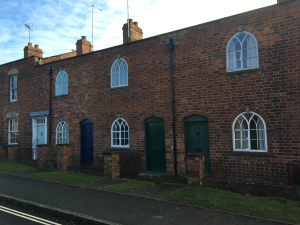 The Government has published online a review of the barriers to carrying out adaptations to historic buildings in England to make them more energy efficient, together with a summary of current actions and future commitments that highlight the roles of Government, planning, local authority and construction skills, capacity, and financial incentives to achieve such adaptations.
The Government has published online a review of the barriers to carrying out adaptations to historic buildings in England to make them more energy efficient, together with a summary of current actions and future commitments that highlight the roles of Government, planning, local authority and construction skills, capacity, and financial incentives to achieve such adaptations.
image for illustration only: Joanna Theobald
… historic homes have specific consideration when adapting them for energy efficiency…
IHBC writes:
The review sets out fifty-five Government actions and future commitments, which include publication of the Historic England Advice Note (HEAN) on Climate Change and Historic Building Adaptation (see NewsBlog report on Friday 12 January) and delivery of online training for Local Authority staff to help them apply the HEAN. Other actions and commitments include a new NPPF policy to support energy efficiency improvements to existing buildings; consultation on National Development Management Policies specifically on improvements to historic buildings; and encouragement of greater use of Listed Building Consent Orders (LBCOs) to support energy efficiency improvements to listed buildings. Ten actions and commitments relate to local authority skills, training and capacity, twelve relate to construction industry skills, training and capacity and a further ten relate to affordability and financial incentives. The remaining sixteen relate to guidance and information.
Ministers (see below) write:
HM Government has set an ambitious target for the UK to become Net Zero by 2050. To achieve this, we need to take steps to reduce carbon emissions in every aspect of our lives. We have already taken bold steps, including:
- investing £6.6 billion over this Parliament on clean heat and improving energy efficiency in buildings, reducing our reliance on fossil fuel heating
- making available £6 billion of new government funding from 2025 to 2028 – on energy efficiency and low carbon heating
- providing long-term funding certainty for energy efficiency and low carbon heating, supporting the growth of supply chains, and ensuring we can scale up our delivery over time.
A vital part of our journey to Net Zero is ensuring that our homes are as energy efficient as possible. Many homeowners are already taking action to increase the energy efficiency of their homes, but we recognise that this may not always be straightforward. In particular, historic homes have specific consideration when adapting them for energy efficiency.
Historic homes are a vital part of our country’s rich heritage and play a crucial role in fostering pride in place. They are cultural assets that we need to protect, conserve and adapt for the benefit of future generations. Ensuring they can be adapted to accommodate energy efficiency measures and low carbon heating in a sensitive fashion is key to ensuring their long-term survival.
Alongside the need to protect and conserve, historic homes have an important contribution to make in meeting our Net Zero objectives, both in terms of their contribution to the broader UK energy efficiency and low carbon heat agenda, and in the carbon which is saved through their continued use and reuse. Historic properties make up a significant proportion of the UK’s building stock, with 5.9 million buildings constructed before 1919. Historic properties can and should be part of the solution, and this report is intended to maximise their potential in supporting our progress towards Net Zero.
Through this review, we have gained a better understanding of the practical barriers that owners of listed buildings and homes in conservation areas face when they want to install energy efficiency or low-carbon heating measures in their properties.
The wide-ranging actions which the government has committed to take forward will ensure that this country’s historic homes are fit for the future and play their part in helping us to meet our 2050 target.
Signed: Baroness Joanna Penn Parliamentary Under Secretary of State (Housing and Communities) Department for Levelling Up, Housing and Communities; Lord Parkinson of Whitley Bay, Minister for Arts and Heritage Department for Culture, Media and Sport; Lord Callanan Minister for Energy Efficiency and Green Finance, Department for Energy Security and Net Zero)
See more HERE and for background to the evidence base from the IHBC see HERE
